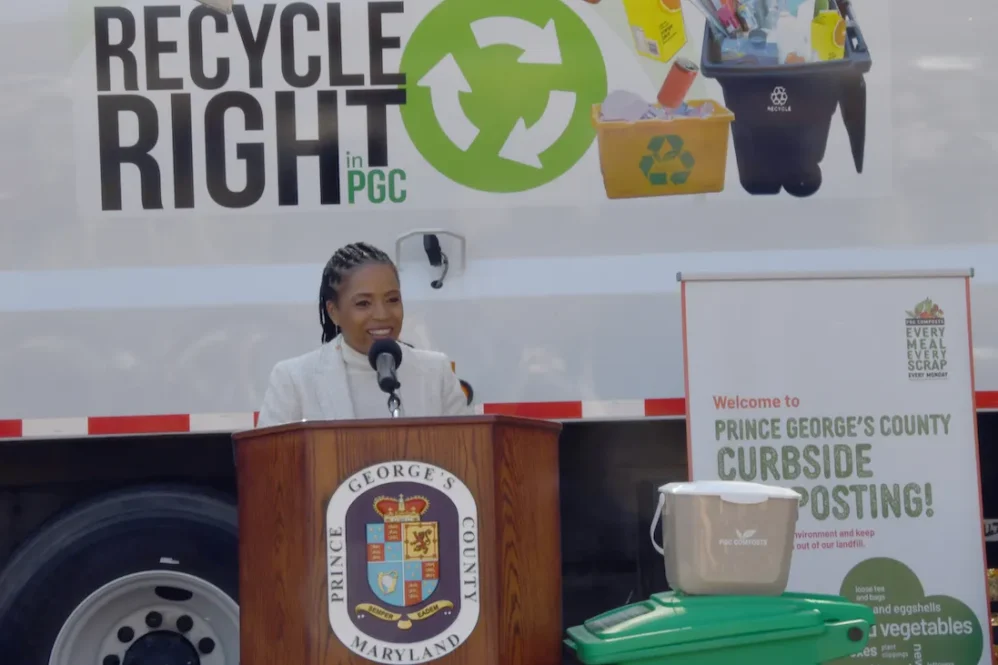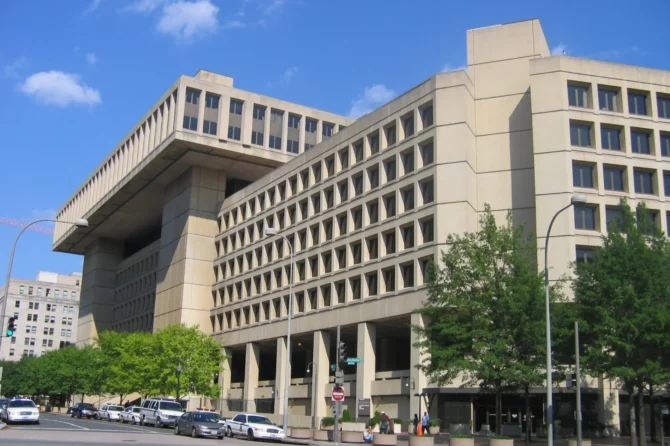WASHINGTON INFORMER: After more than three years in the pilot program phase, Prince George’s County launched curbside compost pickup countywide last week. Every home using county trash services — more than 175,000 households — should receive a new outdoor cart and a smaller indoor pail for composting by the end of next year.
“I know that the idea of composting may be a new one to some of our residents,” County Executive Angela Alsobrooks said at a press conference to announce the launch on Oct. 3. “I can tell you that composting is important because it strengthens the local economy, it reduces waste, it combats the impacts of climate change, and it protects our environment.”
When buried in a landfill, food scraps and other organic waste release high amounts of methane — a greenhouse gas even more potent than carbon dioxide. Composting addresses both climate change and landfill overflow. In addition, some of the composted material is repurposed into a soil additive for improving plant and lawn growth, which the county sells for revenue.
Alsobrooks also touted the expanded curbside program as an environmentally-conscious solution to a problem Prince George’s residents have raised: limited trash collection services. The county switched from a twice-weekly garbage pickup to once a week in 2016, matching the services provided in nearby Maryland counties and in D.C., a change that sparked a backlash. Earlier this year, Prince George’s added bulk trash pickup to the waste collection services provided.
“Our residents have been asking for additional days for waste collection, and the truth of the matter is, this is not an issue that we will resolve by simply putting more trucks on the road to haul more trash to our landfills,” Alsobrooks said. “We cannot afford to go backward in terms of waste collection.”
According to a recent Waste Characterization Study, food and other organic waste make up more than a third of materials found in Prince George’s landfill. Not all residents have been sending their scraps there, though — more than 20,000 Prince George’s households had already opted into the county’s pilot program for curbside composting.
“I think it will make a big difference,” said Betty Wise, an Upper Marlboro resident who was an early joiner of the pilot program. “You know, I noticed that when I put out my green bin, on the regular trash day I only have like one or two kitchen-size bags to put out. So I’m putting out less trash, which means if everybody does that, the landfills won’t fill up as quickly.”
Wise said some of her neighbors have expressed hesitation about joining the program, mostly citing concerns about smells or vermin. To solve that problem, she said she keeps her small compost pail — provided by the county — in her fridge with a compostable liner bag. When the bag fills up, she moves it to her freezer. The frozen bags go into her green bin right before she brings it out to the curb on collection day.
“I think there probably needs to be more marketing and education to get people to come into the program, and when they see the benefit, they’ll do it,” Wise said.
Starting this week, the county began delivering pails and bins to around 65,000 Prince George’s households along with informational materials about how composting works. The remaining eligible households will receive their bins in the spring or fall of 2023.
Andrea Crooms, Director of Prince George’s County Department of the Environment, said that the county is working on expanding the program beyond single-family housing in the future, with small pilot programs including multi-family housing units, schools, and businesses.
In the DMV region, curbside compost collection remains relatively rare, though Takoma Park and Arlington (which started its program just last year) offer it. D.C.’s Department of Public Works plans to implement a pilot program for curbside composting in the spring of 2023.
Currently, District residents can drop off their food waste at designated farmer’s markets across the city on the weekends. Blake Adams, who heads DC’s Office of Waste Diversion, estimates about 3,000 to 4,000 people swing by to drop their scraps every weekend.
“It’s really exciting because once people get interested in composting, they start to pay more attention to how they’re recycling and how much waste they’re producing,” Adams said. “It’s a great way to socialize really sound zero-waste behaviors.”
Photo: Prince George’s County Executive Angela Alsobrooks emphasized the curbside composting program’s twin goals: providing extra trash services for residents and pushing environmental sustainability. (Anthony Tilghman/The Washington Informer)










